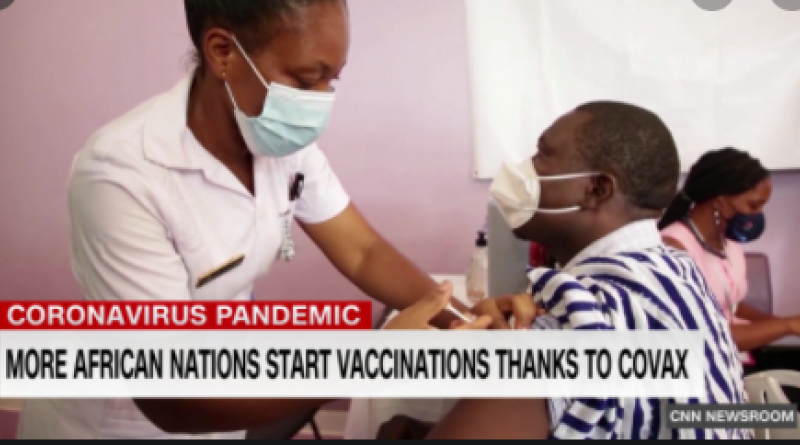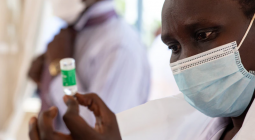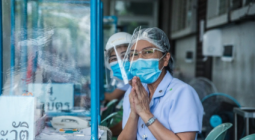Kenya warns of 'vaccine apartheid' as it hits back at the UK over travel ban move

Kenya has sounded the alarm over a potential coronavirus "vaccine apartheid" playing out between countries, as it accused the United Kingdom of instituting a "discriminatory policy" after London issued a travel ban on the east African nation.
"Kenya continues to see, with deep regret, that vaccine producing countries around the world have begun practicing a form of vaccine nationalism, possessiveness, and discrimination, coupled with a vaccine hoarding attitude that can only be described as a form of 'vaccine apartheid'," Kenya's Foreign Ministry said in a lengthy press statement, issued in response to the UK's travel ban.
"This vaccine apartheid, coupled with the reckless calls for vaccine passports while not making the vaccines available to all nations, widens existing inequalities and makes it near impossible for the world to win the war against the pandemic," the statement argued.
Nairobi hit back Saturday against London's decision on Friday to add Kenya to its coronavirus travel 'red list' and announced its own measures on travelers coming from the UK.
Both countries' policy changes will begin on April 9.
A surprise decision
Kenya's principal secretary to the Ministry of Foreign Affairs, Macharia Kamau, told CNN in a phone call on Tuesday that the move from London came "as a little bit of a surprise".
"It's not like we have an out-of-control Covid situation in Kenya -- we do not. It's not like we are not exercising great prudence and it's not like we are not managing the situation diligently here," said Kamau, who formerly served as Kenya's ambassador to the United Nations.
Kenya's Foreign Ministry statement declared all passengers originating from or transiting through UK airports will now be required to spend 14 days in quarantine at a government-designated facility, where they will need to take two PCR tests, all at their own expense.
Kenyan citizens who live in the UK and cargo flights are, however, exempt from these measures.
The UK government's measures go a step further. They say that all travelers who have been in or through Kenya in the previous 10 days will be refused entry to England. British, Irish, and third-country nationals with residence rights will be allowed to enter but will be required to self-isolate in a government-approved hotel quarantine facility for 10 days -- also at their own expense.
"With over 30 million vaccinations delivered in the UK so far, the additional restrictions will help to reduce the risk of new variants -- such as those first identified in South Africa (SA) and Brazil -- entering England," the UK government's Department for Transport said in a statement while announcing the move.
The UK has almost 40 countries on its 'red list'. Many of these countries are African or South American nations. However, European countries that are currently experiencing a third wave of cases, such as France, are not on the list.
The decision to add Kenya to the 'red list' comes as Prime Minister Boris Johnson hailed April as "second dose month," with the country giving more second doses than first doses of the vaccine per day for the first time on March 30.
Over 31 million people in the UK have now received a first dose of a Covid-19 vaccine and more than 5 million have also received their second shot, according to the latest government data.
The UK is seeing a decline in Covid-19 deaths and cases and is taking steps to open up its economy, while Kenya is currently battling a third wave of Covid-19.
On March 26, President Uhuru Kenyatta announced curfews and a ban on almost all movement in or out of the country's biggest cities, including the capital Nairobi, to tackle the outbreak.
International flights were the exception to that travel ban.
However, the UK has seen far more deaths throughout the pandemic than Kenya.
Kenya's total reported Covid-19 death toll on Tuesday stood at 2,258, according to the country's Ministry of Health. The UK's total death toll has topped more than 126,000, according to its government data.
And the daily new confirmed Covid-19 cases per million people in Kenya as of April 6 is 19.2, while the UK stands at 48.75, according to Oxford University's Our World in Data.
The number of confirmed cases is lower in many countries than the number of actual cases, due to reasons such as limited testing, according to Our World in Data.
"We have demonstrated incredible responsibility here. We have kept our numbers impressively low. It's not by accident it is by design and by policy," Kamau said. "If you look at other parts of the world, even our own continent, you'll see that Kenya is a population of 50 million people and with its highly mobile population has still been able to do the necessary things."
An urgent need for vaccines
Amid the row over the travel ban, some Kenyans -- including those in government -- are highlighting the vaccine disparity between London and Nairobi on social media.
Kenya's ambassador to the UN, Martin Kimani, tweeted: "When solidarity is just a word. First came Vaccine Nationalism now we have Vaccine Apartheid," while sharing the Kenyan Foreign Ministry's press statement on the UK travel ban on Twitter.
Kenya, a Commonwealth nation, has requested that the UK -- a country with which it has a long-standing strategic relationship -- share its vaccines, with the Foreign Ministry statement noting: "Kenya is aware that the United Kingdom has [vaccines] in bigger quantities than it currently has use for."
The UK -- with a population of around 66 million people -- has more than 400 million doses of Covid-19 vaccines from eight candidates on order. However, it has not received all these doses yet and not all of these candidates have yet been approved by the UK's medicines regulator.
It is currently administering the Oxford/AstraZeneca and BioNTech/Pfizer vaccines and announced Wednesday it will begin a rollout of the Moderna vaccine too.
The UK Foreign Office declined to comment on the Kenyan statement when contacted by CNN. But the government has said that it will share any future surplus once it has vaccinated its population. The UK has also pledged £548 million ($753 million) to the COVAX scheme, which aims to deliver more than 1 billion vaccines to up to 92 low and middle-income countries this year.
Compared to the UK's 31 million first shots administered, a total of 325,592 Kenyans have received a Covid-19 vaccine as of Tuesday, according to the latest figures from the country's Ministry of Health.
Kenya received its first shipment of vaccines -- 1.02 million doses of the Oxford-AstraZeneca shot -- via the global COVAX program.
The shipment was part of an initial allocation to Kenya of 3.5 million doses.
"It is the only substantial amount of vaccine we've received so we absolutely welcome it and we celebrate it even. But we are a country of 50 million people and it's imperative we vaccinate at least a third of the population... we actually need tens of millions of doses of vaccine, not millions and we need them rather urgently if we are to be effective in stemming this pandemic," Kamau urged.
As part of its drive to get its population vaccinated, Kenya approved Russia's Sputnik V for emergency use in March -- leading to reports that people were privately purchasing the shots for around $70.
Two lawyers claim to be the first two people in Kenya to have received a dose of Sputnik V -- and tweeted images of themselves being vaccinated. CNN has contacted them for comment.
However, on April 2, the Ministry of Health announced it had halted private sector importation and distribution of the vaccines to ensure "greater transparency and accountability."
"There's nothing wrong with Sputnik V just like there's nothing wrong with all the other vaccines... but they need to be brought in in a manner that is consistent with government regulations," Kamau noted.
"In Kenya, the vaccines are free for everybody," he added.
The global disparity in access to Covid-19 vaccines has caused widespread anger among Africa's leaders, including South Africa's president and chair of the African Union, Cyril Ramaphosa, who warned during a World Economic Forum virtual meeting that richer countries are "hoarding" vaccines, and urged global action to ensure an equitable rollout.
Global charity Oxfam, with other members of the People's Vaccine Alliance, a network of campaigning NGOs, also called for an end to 'vaccine apartheid'. In a press release Tuesday, it said rich nations are vaccinating one person a second whilst many developing nations have yet to administer a single dose.
Kamau is not surprised at how things have played out globally, noting "we live in an unequal world."
"Vaccines are a basic human right," he said. "They protect lives, they enhance people's abilities to live their lives fully and allow nations to remain interactive in trading, which is really what is at the core of global development."
7 April 2021
CNN




